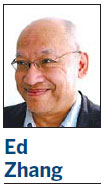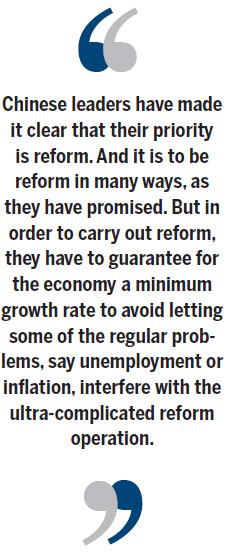Opening the tap a little ensures reforms
Updated: 2015-02-06 07:39
By Ed Zhang(China Daily Europe)
|
|||||||||||
Recent lifting of credit supply part of an insurance policy for vital changes in economy
The timing that the People's Bank of China chose for lifting the credit supply says a lot about Chinese leaders' economic concerns.
On Feb 4, the Chinese central bank announced a 0.5 percentage point cut in the banks' reserve requirement ratio, thus releasing, according to economists, up to about 100 billion yuan ($16 billion) of liquidity to the money market.
Lowering the RRR, failed to excite the short-term investors, because the economy was surrounded by too many discouraging data.

Most investment houses had forecast that China would make a cut in RRR or in the interest rate in the first quarter of the year. But it is obvious that doing so two weeks before the lunar New Year, on Feb 19, would produce a larger benefit for the economy than after the holiday, which, in many parts of the country and therefore at many companies, will not effectively end until the second week of March.
If the central government waited until then to make any move to implement what the central government terms a flexible monetary policy, the policy's effect would be very small, if not negligible, for the whole first quarter.
Obviously it would not be what Premier Li Keqiang wants. At least, he doesn't seem to want the first quarter to go by showing GDP growth lower than 7 percent year on year.
During the several symposiums he has held with economists, corporate leaders and other opinion leaders in the run-up to the annual session of the National People's Congress, scheduled for March 5, he has been quite candid about the fact that the economy is besieged by "many difficulties".
Although an immediate general crush is unlikely, none of the solutions at the moment is perfect, he admitted. Implicitly, a not-so-perfect move will have to be made at times, just to keep the economy from a less desirable situation.

Chinese leaders have made it clear that their priority is reform. And it is to be reform in many ways, as they have promised. But in order to carry out reform, they have to guarantee for the economy a minimum growth rate to avoid letting some of the regular problems, say unemployment or inflation, interfere with the ultra-complicated reform operation.
Some continuing growth momentum is, therefore, economic insurance for reform. As with an individual health insurance policy, that the policy will need to be topped up from time to time to keep up its lasting effect. Every time the central government further opens the tap of money supply, it can be seen as just a new payment for reform insurance. The national strategy now is to channel the money to the modernization of public infrastructure.
It is still hard to tell how long that insurance will have to be used - at least a few more years, one can reasonably infer.
In an immense economy used to one way of doing business for at least 20 years, the transition to a more economical and creative way cannot be made just by pressing a button. If the country's previous transition, that from the Soviet-style planned economy, is taken as a reference point, it may take more than a decade.
In fact, as investors have recently learned from many Chinese companies, from the once-celebrated e-commerce market owner Alibaba and scandal-ridden Minsheng Banking Corp to the wildly expanding Anbang Insurance Group, they would need changes in both business strategy and company structure if they ever want to grow into truly respectable global players. There are major lessons still to be learned.
In the meantime, it is only from this year that China's local governments have begun lowering their ambitions and cutting their borrowing. They still haven't got around to shedding their existing debt burden.
Taking all the above-mentioned factors into consideration, what the central government wants to do is to keep up enough of the money supply to generate a certain amount growth while forcing all companies and local governments to change their ways by not providing them with as much money as they would feel comfortable with. Such will be the big picture of China's 2015.
The author is editor-at-large of China Daily. Contact the writer at edzhang@chinadaily.com.cn
(China Daily European Weekly 02/06/2015 page13)
Today's Top News
Chinese FM eyes 'harvest' for ties with Slovakia
Russia leads UN initiative to target IS
New Greek govt lobbies across Europe for solution to its debt
Birmingham plans to transform city into global financial hub
China: Norway violates rights of Chinese scholar
Italy extradites suspect in theft
A great future for UK-China business relationship
Former IMF chief Strauss-Kahn on trial over pimping charges
Hot Topics
Lunar probe , China growth forecasts, Emission rules get tougher, China seen through 'colored lens', International board,
Editor's Picks

|

|

|

|

|

|





